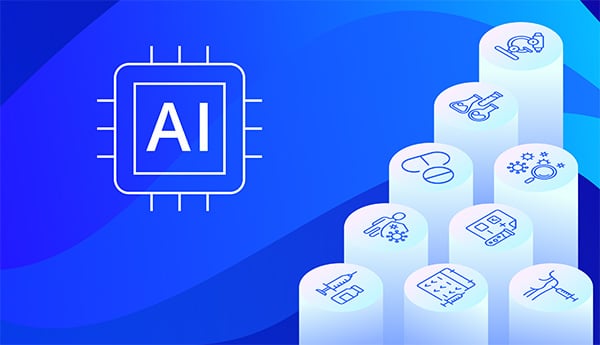
Drumroll please. Allow me to introduce a trailblazing pioneer, a harbinger of a new age of medical breakthroughs and miracle cures. Ladies and gentlemen, please welcome drug molecule DSP-1181 – the first drug developed by artificial intelligence (AI) that is being tested on humans.
OK, so we’re getting ahead of ourselves. DSP-1181 has a long way to go before it is approved for use and AI innovation has been underway for a while in healthcare, including in COVID vaccine development. But let’s get to know DSP-1811 nonetheless because it is heralded as the first non-manmade drug to make it to Phase 1 clinical trials.
In January 2020, British pharmaceutical company Exscientia announced the milestone for the compound, which treats obsessive compulsive disorder and was developed in partnership with Japan’s Sumitomo Dainippon Pharma. It took less than 12 months to take the drug from initial screening to the end of preclinical testing. Impressive since the industry-wide average is about five years. Historically, for a molecule to go from discovery to become a medicine it takes 10 to 12 years and only one in 1000 screened molecules progress to clinical trials at all. Of those that do reach trials, 90% fail, meaning a lot of the $2.6 billion average cost of developing a drug goes down the drain.
So, while regulatory approval for DSP-1181 is no sure thing, the swiftness through early stages points to tremendous potential. And not a moment too soon.
The $1 trillion global pharmaceutical industry has been in a deepening rut for at least two decades. Pharmaceutical companies are spending more and producing fewer successful drugs as the years pass. In 2019, Deloitte found that return on research and development fell from 10.7% to 1.8% over the previous 10 years. Reasons include that the easiest drugs have already been found and “what’s left is hunting for drugs that address problems with complex and elusive solutions and that would treat disorders affecting only tiny portions of the population—and thus could return far less in revenue,” according to a Nature article.
Not only is AI faster but it promises to be much cheaper and more effective. Here is why…
Essentially, AI is a gigantic dragnet cast across multitudinous data bases that could cover genomics, pharmacology, biochemistry, biotech, medical treatment and research, electronic medical records, patient demographics and lifestyle, etc. AI continuously sweeps data sources for all the variables that come into play when hunting for new treatments: genes, cells, cellular behavior, molecules, proteins, targets, receptors, compounds, tissues, symptoms, diseases, therapeutics, patient information … again, only a scientist can list them all.
At the same time, AI combs through all that data finding links, making connections, perceiving patterns, identifying traits, distinguishing trends, ruling out dead ends, capturing subtle nuance, performing complex “thinking” at lightning speed and far faster than humans could do in many lifetimes.
For AI, the goal is not to find the needle in the haystack. It is to find the needle on the farm. Then to find the one piece of thread, which is somewhere in town, that pairs with the specific needle. Then to find the cloak that needs sewing by the precise needle and thread. The cloak is located somewhere in the kingdom. Then to decide how much sewing is needed, what stitch should be used, when it should be sewn, and so forth. Finally, sew the cloak. This is where humans get involved, hoping it works.
Since DSP-1181, Exscientia entered two more drugs in human trials this spring: EXS-21546, an immune-oncology agent, and DSP-0038 to treat Alzheimer’s disease psychosis. Discovery-to-trial time for both was just eight months. Clinicaltrials.gov lists several other AI drugs in the regulatory-approval pipeline.
The question of which AI-developed drug will be the first approved and when is uncertain and almost beside the point. The most important and exciting news is the promise of AI to bring a future of new treatments, cures and better outcomes to improve care and quality of life for patients.
